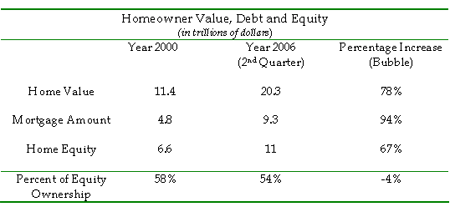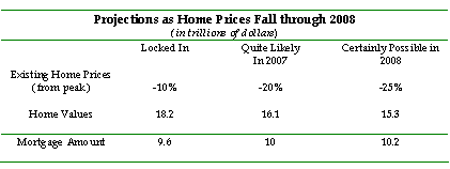Can the US consumer live without equity extraction?
American consumers have been behaving like children, clamouring for newer cars and bigger houses and extracting equity from their homes in order to pay for them. But what happens when the home equity cookie jar is empty?
Get the latest financial news, insights and expert analysis from our award-winning MoneyWeek team, to help you understand what really matters when it comes to your finances.
You are now subscribed
Your newsletter sign-up was successful
Want to add more newsletters?

Twice daily
MoneyWeek
Get the latest financial news, insights and expert analysis from our award-winning MoneyWeek team, to help you understand what really matters when it comes to your finances.

Four times a week
Look After My Bills
Sign up to our free money-saving newsletter, filled with the latest news and expert advice to help you find the best tips and deals for managing your bills. Start saving today!
My first experience with a mob of American children was a job I had working in my hometown park while in high school. At one summer party, my job was to hand out candy to the children. I grew impatient handing it out piece by piece so to speed up the process, I started throwing it by the handfuls to the kids. I was shocked as their response was immediate and totally unexpected. I was soon chased through the park by a hungry mob of excited children who wanted their candy, and they wanted it now. This fond memory reminds me of the American consumer today because they continue to behave very much like those excited children.
Every day we are bombarded with advertisements and ads speaking to our inner child. We, as consumers, are so conditioned to buy that fancier car or bigger house because the auto dealerships and bankers are offering financing terms that have made it so easy. The loans being offered today are so flexible and, at first glance, appear affordable because they're interest-free, 40-year, no money down/no payment due, piggyback, adjustable-rate, etc. The former Federal Reserve Chairman even encouraged "really sophisticated" consumers to take out ARM mortgages and extract equity from their homes. As a result, consumers have been lured into debt big time with these loans.
Back in 2000, when homes were worth $11.4 trillion, there were only $4.8 trillion in mortgages against them. In the second quarter of 2006, that mortgage debt increased to a whopping $9.3 trillion.
MoneyWeek
Subscribe to MoneyWeek today and get your first six magazine issues absolutely FREE

Sign up to Money Morning
Don't miss the latest investment and personal finances news, market analysis, plus money-saving tips with our free twice-daily newsletter
Don't miss the latest investment and personal finances news, market analysis, plus money-saving tips with our free twice-daily newsletter
Increases in consumer borrowing pushes up economic spending and corporate profits and is far more powerful than wage or salary increases. To put it simply, when a dollar is borrowed, the full amount can be spent; when a dollar is earned, taxes need to be paid so depending on your tax rate, you're left with about $.60 - $.80 cents.
Surprisingly, even with the increases in housing prices over the last few years, the percentage of equity in homes has actually fallen from 58 percent in 2000, to 54 percent today. See chart below:
Homeovner Value, Debt and Equity

If you read the financial press, you'll know that new home prices have already been marked down almost ten percent. The markdowns do not even include incentives being offered such as free swimming pools, granite counter tops, or free maintenance for a year. It would be a miracle if the prices of old existing homes didn't follow the same path down in price.
Some of our clients who work in the distressed arena and buy crappy mortgages have reviewed large nationwide portfolios of existing homes that are up for sale because of mortgage default. Their findings indicate that prices are already down 8 20 percent on average across the country! Remember, based on actual history of past real estate bubbles, the housing price drop is almost certain to take 2 to 3 years before it hits bottom.
Why are home prices vulnerable?
The primary reasons why home prices are so vulnerable are: Home values have bubbled up almost 80 percent in just a few short years; Speculators and flippers bought a few million homes they now can't sell; $1 trillion of adjustable-rate mortgages are scheduled to adjust upward in 2007; Lenders permitted sub-prime borrowers to buy homes with no credit and no real money down.
There are currently 10 million homes in this country and if they were sold today, they would sell for less than the existing mortgage balance. This means the homeowner has "negative equity". Foreclosures have just started rising, and sellers of existing homes are watching as builders are dumping inventory, driving down prices across the board. New home construction is running far higher than new home sales, and inventories are bulging while buyers are on strike. The good news is that mortgage lenders have begun verifying home appraisals and borrower income (long overdue). The bad news is that home equity is evaporating quickly and you can't borrow against negative equity. See chart below:
Projections as Home Prices fall through 2008

The wages and salaries component of personal income, for all the working stiffs in America, totals about $6.2 trillion.
(In 2000, equity extraction was only about $160 billion, or just over 2 percent of wages and salaries. By 2005, it reached $511 billion, or eight percent of wages and salaries. In the first half alone of 2006, it reached almost $500 billion, or 15 percent at an annual rate!)
Could Americans manage without equity extraction?
Including the tax effect mentioned above, Americans will need a wage increase of about 20 percent to make up for a loss of purchasing power if home equity extraction goes away. (I sincerely doubt Americans can expect this type of raise from their generous employer next year.)
I must humbly admit that I can't be certain what is going to happen, particularly in the future. However, I do know that specialty retailers can't get sales up; Ford, GM, and Chrysler can't figure out how to sell cars and auto production needs to be scaled back in the 4th quarter of 2006, and the 1st quarter of 2007; Home Depot is starting to sell general household goods because home owners are scaling back on home improvements; Wal-Mart's sales are off and they have declared a major price war with Target, Best Buy (and any other retailer that wants to sell to mid-America) this Christmas season.
Don't forecast; do the arithmetic yourself. Companies that either sell to the consumer or manufacture goods will be left scratching their heads as they scramble to find ways to get the consumer to spend. They'll be hiring less people and cutting back on production and investment. Home builders have already halted new home construction in an over-saturated market. Less spending means fewer jobs. Even after taking $250 billion out of the house in the 3rd quarter, GDP was only up 1.6 percent so when the home equity extraction ends, GDP will go negative! When this happens, we'll all have to sit back and see how the childish consumer reacts when the Home Equity Cookie Jar is Empty.
Written by Richard Benson and published in Benson's Economic and Market Trends 31/7/2006, www.sfgroup.org
Get the latest financial news, insights and expert analysis from our award-winning MoneyWeek team, to help you understand what really matters when it comes to your finances.
MoneyWeek is written by a team of experienced and award-winning journalists, plus expert columnists. As well as daily digital news and features, MoneyWeek also publishes a weekly magazine, covering investing and personal finance. From share tips, pensions, gold to practical investment tips - we provide a round-up to help you make money and keep it.
-
 Should you buy an active ETF?
Should you buy an active ETF?ETFs are often mischaracterised as passive products, but they can be a convenient way to add active management to your portfolio
-
 Power up your pension before 5 April – easy ways to save before the tax year end
Power up your pension before 5 April – easy ways to save before the tax year endWith the end of the tax year looming, pension savers currently have a window to review and maximise what’s going into their retirement funds – we look at how

